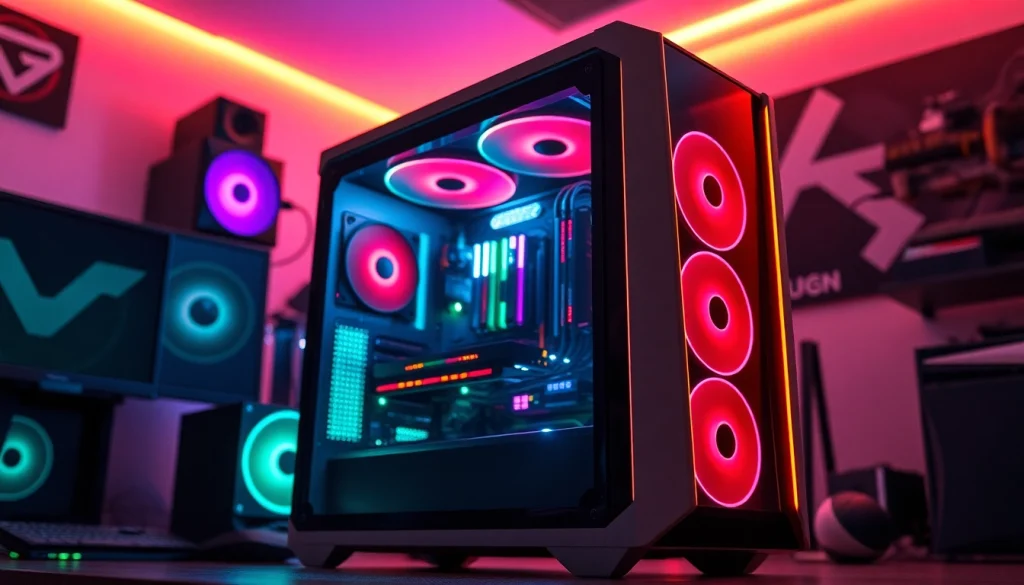Top Qualities of a Leading PC CASE Manufacturer: What to Look For

Understanding the Role of a PC CASE Manufacturer
The ever-evolving world of technology demands efficiency, innovation, and creativity. Within this landscape, the PC CASE Manufacturer plays a pivotal role. A PC case serves as the foundation for a computer build, housing essential components and ensuring optimal performance. But what defines a successful PC case manufacturer? In this article, we will delve into the attributes that set leading manufacturers apart, explore design considerations, and provide an overview of the current market for PC cases.
What Makes a PC CASE Manufacturer Stand Out?
A standout PC case manufacturer typically embodies several vital characteristics: commitment to quality, innovative design, effective cooling solutions, and customer support. Quality is paramount; cases must withstand the tests of time, providing reliable protection for internal components while featuring robust construction. Manufacturers that employ high-quality materials like aluminum or tempered glass tend to garner more favorable reviews among users.
Innovation is equally crucial. Manufacturers like Corsair and NZXT have revolutionized the industry with RGB lighting, cable management systems, and modular designs that allow users to easily customize their builds. Furthermore, effective cooling solutions – including airflow optimization, compatibility with liquid cooling systems, and the use of quiet fans – are essential for performance enthusiasts.
Customer support is another defining feature. Leading manufacturers offer detailed product documentation, helpful resources on their websites, and responsive customer service to address user concerns.
Key Features to Consider in PC Case Design
- Form Factor: The size and type of components that can fit into the case (ATX, Micro-ATX, Mini-ITX).
- Cooling Options: Adequate space for fans, radiators, and airflow pathways.
- Material Quality: The durability and aesthetics of the materials used.
- User-friendliness: Features that ease the assembly process, like tool-free designs and accessible cable management.
- Expandability: The potential for additional drives, graphics cards, and upgrades.
These features contribute not only to aesthetics but also to the performance capability and longevity of the system housed within the case.
Market Overview of Popular PC Case Manufacturers
Today’s market is thriving with several well-established and emerging brands. Big names like Corsair, NZXT, Thermaltake, and Fractal Design dominate the landscape, recognized for their combination of quality and innovative features. Corsair’s 4000D case, for instance, is well-received for balanced airflow and cable management. NZXT’s H510 series is also popular, featuring sleek designs and ease of use that appeal to first-time builders.
Emerging manufacturers have started to make their mark by offering unique stylistic designs and affordable options, catering to first-time builders and gamers looking for customizability without breaking the bank. As competition increases, manufacturers are challenged to innovate continually, leading to better products and prices for consumers.
Material Choices and Their Impact
Types of Materials Used by PC CASE Manufacturers
The choice of materials significantly affects the overall quality, performance, and aesthetics of a PC case. Common materials include:
- Steel: Known for its strength and affordability, steel is often used in budget cases but can be heavy.
- Aluminum: Lightweight and premium-looking, aluminum is favored in higher-end cases but tends to be more expensive.
- Tempered Glass: A popular choice for side panels, tempered glass provides a sleek view of internal components and RGB lighting but requires careful handling.
- Plastic: Used in budget cases, plastic can reduce costs but may lack durability.
Each material brings distinct advantages and drawbacks, making it crucial for users to consider their needs when selecting a case.
The Importance of Material Durability
Durability is a critical factor when evaluating a PC case. Quality materials ensure that the case can withstand physical weariness, securing valuable components against damage. For instance, aluminum cases resist scratches better than plastic counterparts and offer superior thermal management properties. Additionally, the material’s resilience against vibrations and impacts is essential in maintaining the integrity of fragile components such as SSDs and graphics cards.
Cost vs. Quality in PC Case Manufacturing
While the relationship between cost and quality can often present a challenge for consumers, it’s essential to view it through the lens of value. Budget cases might seem appealing but may lack structural integrity and features that enhance user experience. Conversely, premium cases often justify their higher prices through superior materials, advanced cooling solutions, and aesthetic design.
Ultimately, investing in a durable, feature-rich case can translate to a better maintenance experience and, over time, potentially save money by reducing wear and tear on internal components.
Customizability and User Preferences
How Custom Options Enhance User Experience
Customizability is at the heart of user satisfaction in PC building. Cases that allow modifications, such as interchangeable side panels, customizable RGB lighting, or modular drive bays, cater to users’ desires for personalization and unique aesthetics. Furthermore, accommodating additional cooling systems or large GPUs facilitates a more tailored experience, aligning with users’ performance needs.
Brands like Lian Li and Phanteks excel in this arena, offering deep levels of customization that entice builders who wish to create signature setups.
Trends in PC Case Customization
Current trends showcase an increasing demand for cases that allow RGB lighting integration and transparent panels for showcasing internal components. Gamers and enthusiasts often seek out cases that facilitate optimal airflow while also providing a stunning visual impact. Brands are responding with cases designed specifically for gaming aesthetics, featuring pre-installed lighting and customizable settings through software.
Balancing Aesthetics and Functionality
Striking a balance between aesthetics and functionality is essential for a successful PC case design. Cases must not only look appealing but also perform efficiently. Manufacturers like Cooler Master and Corsair have made strides in this area by combining sleek design elements with effective cooling solutions and practical layouts that simplify component installation.
Logically placed cable routing and space for fans and radiators contribute to better airflow, while vibrant designs attract those focused on visual appeal.
Innovative Designs from Top PC CASE Manufacturers
Exploring Unique Designs in the Industry
Innovation drives consumer interest, leading manufacturers to explore unique designs that stand out. For example, the In Win 909 offers a distinctive design with its full tempered glass structure and aluminum frame, aimed at those wanting a minimalistic yet elegant look. The BitFenix Portal takes uniqueness a step further with its modular design, allowing users to modify the case configuration according to their needs and preferences.
Case Studies of Successful PC CASE Manufacturing Brands
Examining leading brands like Corsair and NZXT illustrates how design and customer engagement impact market success. Corsair’s implementation of a modular design in the 4000 Series allows for extensive customization, enhancing user experience while addressing common user complaints about cable management and airflow. Similarly, NZXT has focused on software integration that complements their hardware, providing an ecosystem that works seamlessly together, which elevates the overall customer experience.
How Design Influences Performance and Cooling
An effective design significantly influences a case’s performance and cooling capabilities. Features like mesh panels for airflow and strategic fan placements can enhance thermal performance by allowing heat to dissipate quickly. Brands that prioritize efficient airflow layouts improve user satisfaction and reduce thermal throttling in high-performance builds.
Incorporating these cooling principles into the design not only helps maintain optimal operating temperatures but also extends the lifespan of critical components.
Future of PC CASE Manufacturers in Technology
Emerging Trends to Watch in PC Case Manufacturing
The future of PC case manufacturing is shaped by emerging trends, including sustainable practices, advanced cooling solutions like liquid cooling integration, and smart technology. As the environmental impact of technology continues to be a pressing concern, many manufacturers are exploring eco-friendly materials and production methods. Additionally, enhanced compatibility with liquid cooling solutions and modular designs catering to the latest hardware trends, such as vertical GPU mounting, continue to gain traction.
Impact of Sustainable Practices on PC CASE Manufacturers
Sustainability is becoming a key focus for PC case manufacturers. Brands that prioritize eco-friendly practices not only reduce their carbon footprint but also resonate with environmentally conscious consumers. The utilization of recyclable materials and energy-efficient manufacturing processes is increasingly vital, and companies like Lian Li have started integrating these concepts into their business models. As consumers show a growing preference for sustainability, manufacturers adapting to these principles stand to gain a competitive edge.
Predictions for PC CASE Designs in the Next Decade
Looking ahead, we anticipate several transformative changes in the design of PC cases. Innovations in smart technology may lead to cases integrated with IoT devices that can monitor temperature and automate cooling fan adjustments. Additionally, as VR and AR technologies evolve, cases that cater to new hardware form factors are likely to emerge, pushing the boundaries of traditional PC design. The future will also likely see an expanded focus on modularity and ease of access, allowing users more freedom to upgrade and customize their builds without complicated disassembly.







